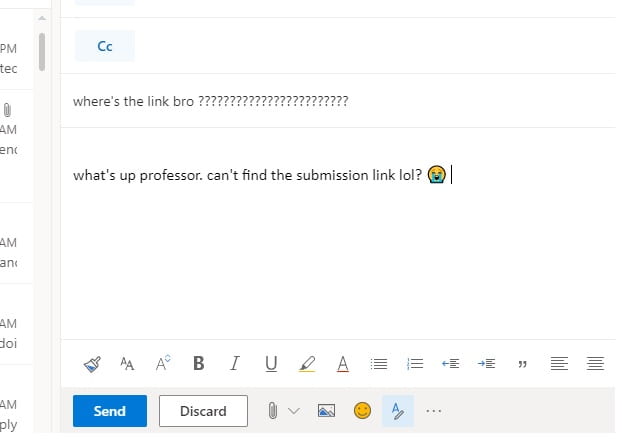By Christina Barnes
The sudden transition from in-person to online classes can be tricky to navigate, especially when you consider that we have to practice social distancing on top of that. Distance learning can definitely be a drag some days because it presents new challenges for everyone involved–you, your instructors, and your peers.
Thankfully, we live in a tech-driven world, so if you haven’t yet gotten to know virtual learning and communicating platforms like Blackboard Collaborate, Zoom, Skype, WebEx, or Google Hangouts, you will soon become an expert in using them!
We’re fortunate that we can remain connected despite social distancing, so I wanted to share some advice I’ve learned since going 100% online.
Think About Your Message
When something goes wrong, like an assignment outline is posted in the incorrect place, or a submission link is missing, working online can get very frustrating. However, it’s important to keep in mind that everyone (including your instructors) is doing the best that they can to navigate this weird situation where all we have is our computer screens.
If you see a problem with your course content online, make sure to reach out to your instructors right away, but do so in a polite and respectful way. It’s so important to have grace and be mindful of everyone’s struggles during this difficult time. Your instructors are only human like you, so it’s important for us to be patient with one another.
Start emails with the proper greeting and end them with a courteous farewell or invitation to follow up. You may feel frustrated and entitled to receive a response right away, but this does not mean that you should abandon the etiquette you would normally follow. Properly and politely-written emails convey respect and also show who you are as an individual.
Notice the difference in tone between the two versions of the same message:
- “I can’t find the submission link. Where is it?”
- “Hi, Dr. Smith! / This is A, from your class B, section C. I can’t seem to find the submission link for Assignment X. Could you please point me in the right direction? / Thanks! Sincerely, A.”
It takes about ten seconds more to write the longer version of the same email, but it makes all the difference! The golden rule of “speak the way you would like to be spoken to” has never been more important.
Plus, the second version of the first message is not only polite, but it is also clear and concise. If you take two minutes to explain the problem properly, it’s likely you will get the answer and the solution you’re looking for much quicker!
Get the Right Tools
If you’re able, invest in a high-quality headset or opt for a good pair of earbuds. This will improve the quality of your online meetings and make it easier you and the person on the other end when you’re trying to communicate. It’s also always best to use some type of earbuds or headphones instead of using your speaker because of the echo often produced by other people’s audio.
I’m sure you’ve hear this time and time again, but it warrants repeating–make sure to mute your audio whenever you’re in a meeting with several people and it’s not your turn to speak! It can be really distracting and you and your peers will struggle to communicate clearly if everyone’s audio is on at once. This is especially true if you live with roommates or family that can suddenly burst into the room shouting!
Try Screen-Sharing for Troubleshooting
Next, if you’re having trouble with a homework issue that you can’t quite explain in an email, consider asking your professor to join you online and use screen sharing! Many apps are able to reflect what’s on your screen to another person. If it’s a video or film assignment, these apps can even share the computer audio.
Remember that if you’re a current U of A student and you’re having any type of technical issue with your computer software, you can always reach out to our IT specialists at the University and they will be able to help you out. Don’t struggle alone–this is a time for reaching out if you need help!
Your Calendar Is Your New Best Friend
I also recommend utilizing your calendars. You schedule may be all mixed up now, so it will be important to keep track of new virtual meetings you might not have had before. Many virtual communication sites and apps give you the option to download a calendar invite to your Google or Outlook calendars so you never miss a beat!
Right now it can often feel like time has stopped existing–you may not be waking up at the times you used to or are now having breakfast at noon! To combat this, set reminders on your phone about meetings you’ve scheduled or lectures that you must attend online at specific times. It will not only help you stay on track, but will also get you into a routine of staying organized.
The same goes for anything else that you would usually do–you can set reminders to do groceries, laundry, or to exercise at specific times. Time flies when you’re in self-isolation, so don’t let it fly away from you!
Socializing Is Still an Option!
If you’re a social butterfly like me, you might agree that one of the most challenging things has been missing friends, classmates, and your cohort. The same sites we use for school can work to keep us connect to friends, too!
Schedule a friend brunch and eat your food over video chat or synchronize a movie night, or have a coffee chat during a break in the middle of the day. This is probably one of the more fun ways to catch up with people, especially if they bring their pets!
Lastly, and most importantly, remember that these are challenging times for everyone so if your circumstances are making it hard for you to maintain communication, it is okay to prioritize yourself and your mental health. Your teachers and peers will understand–just keep everyone in the loop. We are in this together, so let’s help each other out however we can, even if it’s just by being extra mindful of how we communicate during this difficult time.















